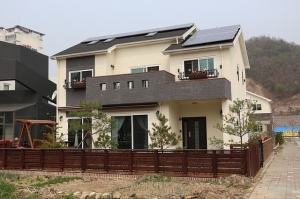Building energy-efficient homes requires attention at all phases of construction, both inside and outside the home. If a buyer wants to save on utility bills, thorough construction methods and eco-friendly building products will help them attain that goal. Here, buyers can read more information on environmentally-friendly, energy-efficient home building practices.
Energy-Efficient Construction on the Outside
Eco-friendly and energy-efficient building methods can put a home on a good foundation. Depending on local building codes, a foundation can contribute to a home’s overall energy efficiency. By establishing a foundation with insulating properties and by incorporating features that allow passive cooling and heating, Georgia home builders can contribute to the home’s overall efficiency.
Windows and Siding
House siding and windows can work together to reduce energy usage. By choosing the right insulation depth for the area, and semi-custom home neighborhoods by using double- or triple-pane windows, builders can help homeowners keep indoor temperatures comfortable without putting undue stress on the air conditioning system. Careful placement of windows by the best home builders in Augusta GA can allow more natural light into the rooms, reducing the need for and expense of home lighting.
Roofing
Methods of manufacture have lead to the creation of reflective roofing materials. These materials can help to keep the attic cool, as can ensuring that there’s enough insulation upstairs. A radiant barrier on the bottom of roof decking can help to conserve energy, as can the installation of rooftop solar panels. A builder can offer more advice on choosing energy-efficient roofing materials.
Lighting
During construction, home builders in South Carolina will work with contractors and electricians to set up an efficient lighting scheme. Using LED and CFL bulbs will not only cut energy consumption, it will put less stress on the HVAC system.
Appliances and Water Heaters
Using an on-demand water heater can significantly increase energy efficiency. Because there’s no storage tank, the heater only warms water on an as-needed basis. Installation of Energy Star-rated appliances can improve the home’s energy efficiency with a minimal upfront investment.
Landscaping
A home’s landscaping can also affect its energy efficiency. Proper placement of shade trees and shrubs can cool the home in the summer, and installing a rainwater collection system can help to keep the lawn green.
If a buyer wants a new home, careful planning can help them build one that’s energy efficient. With a smaller carbon footprint and more efficiency, smart homebuilding can benefit everyone.
